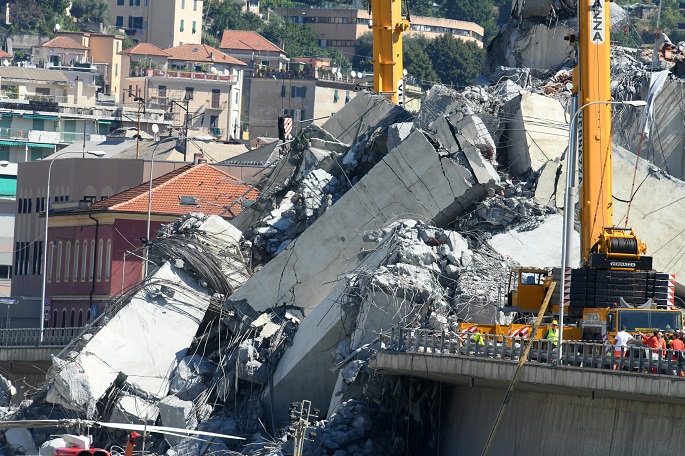Italy to revise infrastructure concession system after Genoa bridge collapse
Published : 28 Aug 2018, 02:17
Italy would soon revise the concession system concerning the country's infrastructures, and decide whether to re-nationalize some of them, the Infrastructures and Transport Minister Danilo Toninelli said on Monday.
"By September, I will summon all infrastructure concessionaires, asking them (to provide) a detailed plan of ordinary and extraordinary maintenance interventions," Toninelli told the parliament's joint Environment and Public Works committees in a hearing.
The minister explained the government would do all it could to "revise entirely the concession system and the contract duties (falling on concessionaires)."
"We will decide case by case whether the public interest is to be better served by forms of nationalization, or by renegotiating the current contracts in order for these to be less in favor of private concessionaires," he told lawmakers.
Toninelli's address to parliamentary committees concerned the partial collapse of a major motorway bridge in the northwest city of Genoa on Aug. 14, in which 43 people were killed.
The viaduct was operated by Autostrade per l'Italia (part of Atlantia holding company), which holds the concession to manage most of Italy's highway network.
"Genoa's collapse was not the result of a tragic chance, but rather an event confirming the dramatic need of a national maintenance plan that our government has been signalling since it was named," Toninelli stressed.
"We are talking about a wide plan of ordinary and emergency maintenance on our territory and on existing infrastructures, with scheduled and continuous interventions."
In the same day, Giovanni Toti, the governor of the Liguria region surrounding Genoa city, appealed for the collapsed bridge to be "demolished and reconstructed as soon as possible."
"Under current rules, this operation is under the responsibility of Austostrade per l'Italia, which must ensure this is done with alacrity, and obviously sustaining all costs," Toti told a broadcast press conference in Genoa.
Major sections of the collapsed bridge were still standing, and needed to be removed in order to build a new structure, which would serve as a major connection between Genoa west and east, and towards two highways.
After checking the security of the parts still standing last week, the technical inspectors appointed by the Infrastructure Ministry warned some of them were precarious -- especially the eastern section -- and needed to be swiftly torn down.


